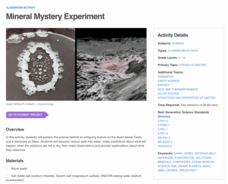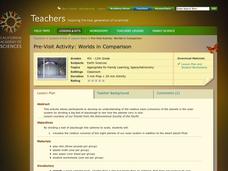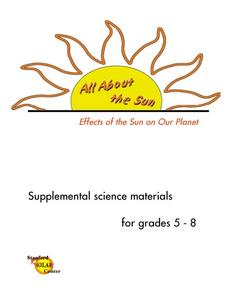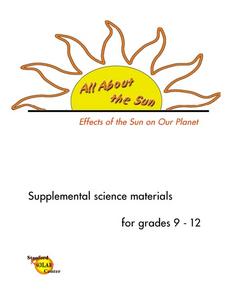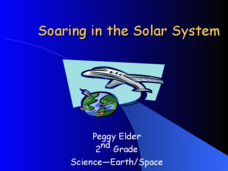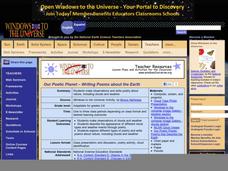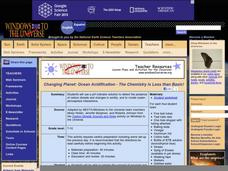American Museum of Natural History
What Do You Know About Astronomy
Develop an understanding of the universe. Learners answer 10 multiple choice questions about several topics in astronomy. Questions contain information about the age of the universe, gravitational attraction, galaxies, planets and comets...
NASA
Mineral Mystery Experiment
One way to study something is to try to replicate it. Young scientists do just that as they use solutions to recreate mineral structures on a dwarf planet. They make solutions with different types of salt, evaporate them, and observe the...
Curated OER
Solar System Hall Model
Not novel, but fun, this activity gets your space science learners to model the size of the planets and the solar system along your school's hallway. Scaled measurements as well as actual distances are provided for both planet diameters...
Pacific Science Center
Worlds in Comparison
Young astronomers follow a step-by-step procedure for dividing a lump of dough into parts, resulting in a scaled volume set of puny planets. Along with the printable directions is a template chart of planet names on which learners can...
Curated OER
Out of This World 1
In this planets research skills worksheet, learners use their research skills to fill in the blanks in 15 sentences regarding the planets.
Curated OER
Astonishing Planetary Discovery
Students access the Internet, research one of the planets, copy and paste necessary information, and design a creature that would survive for a year on their planet. They present their creature and its qualities to the rest of the class.
Curated OER
Planets And Moons Web Quest
Students work with a partner using the Internet to find the answers to a web quest about space exploration. They work in cooperative groups to discuss information and evaluate its importance to space exploration.
Curated OER
Effects of the Sun on Our Planet
Students examine the effect of different types of light on the Earth. They discover the role of evaporation and the effects of the sun on the magnetosphere. They also observe different solar phenomena.
Curated OER
Effects of the Sun on Our Planet (Grades 9-12)
Students examine the Earth's magnetosphere and observe the effects of the sun's energy on it. They discover the difference between true north and magnetic north. They also explore how solar cells convert solar energy to electricity.
Curated OER
Groundwater-Water we doing to our planet?
Students see how much runoff occurs by an average shopping mall parking lot. In this groundwater lesson students complete a lab and a handout.
Curated OER
Surfing to the Planets on the Internet
Seventh graders explore the planets using computers and other forms of electronic technology. They research data on two planets and compare the data. Students make conclusions regarding the size of their planets. They calculate how long...
Curated OER
The Planets
For this planets worksheet, students read a one page text about the planets. Students read details and facts about each planet. Students answer 12 questions about the text.
Curated OER
Planet Cards
In this science card activity, learners cut out the different cards and study the planets Earth, Venus, Mercury, Saturn, Jupiter, Mars, Pluto, Neptune, and Uranus. Students' objective is to learn each planets' orbit, rotation, distance...
Curated OER
Our Changing View of the Solar System
Students identify and name the eight planets and the five dwarf planets in our solar system. In this space science lesson, students view a slideshow of the planets and label them on an included Solar System chart.
Curated OER
Planets or Not, Here We Come!
Students, working in groups, research planets in terms of the size, temperature, number of moons, and potential for life. They use packets and worksheets as guides for their research. Students may role-play as aliens visiting their...
Curated OER
Soaring in the Solar System
Who doesn't love learning about space? This presentation provides a mnemonic device and a song to help young students remember the names and basic facts about each of the nine planets in our solar system.
Chicago Botanic Garden
Personal Choices and the Planet
The last activity in the series of four has individuals determine steps they can take to reduce their carbon footprints and then analyze their schools' recycling programs. Through a sustainability audit, they identify how and where their...
Chicago Botanic Garden
Personal Choices and the Planet
How big is your footprint? Activity three culminates the series by having groups complete carbon footprint audits with people in their schools and/or around the districts. Groups then gather their data, create a presentation including...
Howard Hughes Medical Institute
Paleoclimate: A History of Change
Earth's climate changed drastically throughout the history of the planet, so why do scientists blame humans for recent changes? Observe data covering the history of the planet that proves the natural climate change patterns. Then, learn...
NASA
The Saturn System Through the Eyes of Cassini
Get a close-up view of Saturn. Pupils read a NASA eBook filled with images of the Saturn system, including the rings and moons of Saturn along with images of the planet itself. Learners become familiar with the planet's system as they...
Curated OER
Our Poetic Planet - Writing Poems about the Earth
As a way to combine language arts and science, try this lesson on writing cloud poetry. Begin by showing a PowerPoint presentation and images of cloud types. Take meteorology masters outdoors to explore the sky using the provided "Cloud...
Curated OER
Changing Planet: Infectious Diseases Classroom Activity
Here is a different approach: emerging epidemiologists first go home to interview family on the topic of infectious disease. Then they come to class and view a video and PowerPoint that explore how climate change may increase the...
Curated OER
Changing Planet: Melting Glaciers
Resource links to a video, satellite images, data, and photographs of glaciers provide emerging earth scientists the opportunity to examine how the ice has been retreating over the years. A data table is included for pupils to record...
Curated OER
Changing Planet: Ocean Acidification - the Chemistry is Less than Basic!
A video and laboratory investigation are highlights to this lesson on acidification of ocean water due to increased atmospheric carbon dioxide. Using bromothymol blue (BTB) as an indicator, pupils analyze the amount of carbon dioxide...
Other popular searches
- Inner and Outer Planets
- Worksheets Planets
- Paper Mache Planets
- Inner Planets
- Nine Planets
- The Planets
- Imaginary Planets
- Sun and Planets
- Stars and Planets
- Planets Outer Space
- Planets and Astronomy
- Outer Planets



